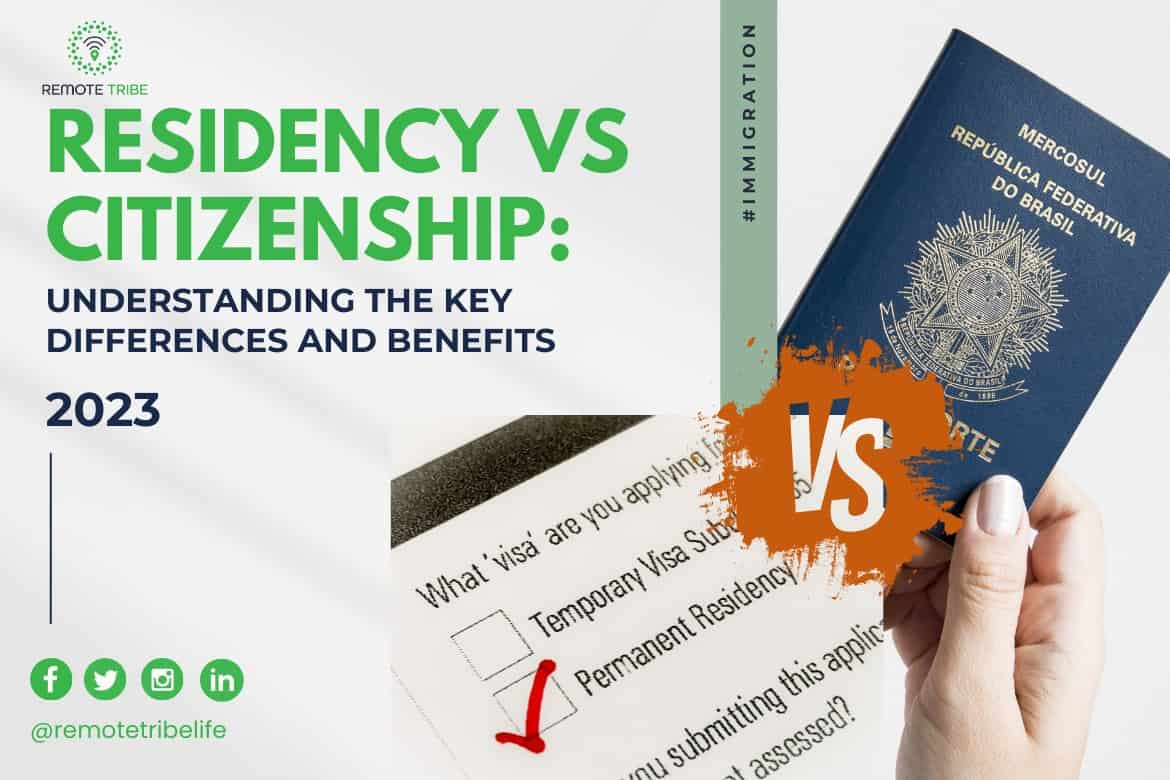Citizenship vs Residency - Everything you need to know
In a more and more interconnected world, it’s important to understand the distinctions between residence and citizenship in the context of immigration. These two ideas are crucial in establishing the rights, advantages, and obligations of people who choose to immigrate to another country. So what is the difference between residency and citizenship?
While residence allows someone to lawfully stay in a certain nation, citizenship provides a more comprehensive status with long-term links and extensive benefits.
In this thorough guide, we will examine the fundamental distinctions between residence and citizenship, as well as the benefits and drawbacks of each, to assist you in making educated judgments about your immigration options.
Table of Contents
Residency: A Closer Look
What is a (permanent) residency?
Residency refers to the legal status of individuals living in a specific location without the need for citizenship. It grants them the right to reside and work in that country. Residency can be either temporary or permanent, and it is typically obtained through fulfilling specific requirements such as documentation, financial criteria, language proficiency, and background checks.
Temporary and Permanent Residency
Temporary residency allows individuals to live in a country for a specific period, often tied to employment or educational purposes. It provides flexibility for individuals who wish to experience living in a different country without committing to permanent relocation. On the other hand, permanent residency offers stability and allows individuals to reside indefinitely in the country of their choice. Some countries also provide long-term residency options to cater to the needs of individuals who desire a middle ground between temporary and permanent residency.
Benefits of Residency

Greece, an EU member state, is one of the countries offering a residency programme through its Golden Visa or Digital Nomad Visa
Residency comes with a range of benefits, including access to healthcare, employment opportunities, education, property ownership, and investment options. Depending on the country, residents may have the right to work, live, and access certain public services. Residency also provides individuals with the opportunity to experience a new culture, enjoy a more affordable cost of living, and align themselves with a place that resonates with their vision and mentality.
Citizenship: An Overview

Citizenship is the legal status of being a recognized member of a country, entailing specific rights, privileges, and responsibilities. It can be acquired through various means, such as birth, ancestry, military service, special programs, investment, marriage, or naturalization.
Acquiring a Citizenship
Citizenship can be acquired through birthright, which grants individuals citizenship if they are born within a particular country’s territory. Citizenship through descent or ancestry allows individuals with parents or grandparents who are citizens of a specific country to claim citizenship based on their familial ties. Naturalization is another common route, wherein individuals can apply for citizenship after meeting eligibility criteria and going through a legal process, which may include residency requirements, language and cultural knowledge assessments, good moral character evaluation, and citizenship tests and interviews.
Advantages of Citizenship
Citizenship offers numerous advantages, including the right to vote, unrestricted international travel with a passport, and increased economic opportunities. Citizens have the privilege to actively participate in the political process, run for public office, and hold public office. They also enjoy the freedom to travel to numerous countries without the need for visas, facilitating international mobility. Additionally, citizenship can provide individuals with a sense of belonging and identity, as well as the ability to pass down citizenship to future generations.
Difference between Residency and Citizenship - Head to head comparison
To make informed decisions about your immigration options, it is crucial to understand the differences between residency and citizenship. These differences significantly impact the rights, privileges, and responsibilities of individuals in their new countries. Let’s explore some critical points of comparison:
Difference
Permanent Residency
Citizenship
Access to education and employment abroad
Limited opportunities to work and study abroad
More options to get employed or universities to choose from
Passport
You cannot apply for a passport as soon as you are a permanent resident, in some cases you can never qualify for a passport.
Right to apply for a passport
Protection abroad
No protection when travelling abroad from your host country
Access consular services when abroad
Freedom of movement
Limited visa access with a permanent residency card, depending on the country or block rules (EU, SEA,etc)
You can travel visa free or exemptions
Right to vote
You can vote in some cases for council level elections. However, not for higher chambers like Parliaments and so on.
Citizens have full voting rights
Legal and Political Rights
Citizenship offers comprehensive legal and political rights that extend beyond what residents typically enjoy. Citizens have the privilege to actively participate in the political process, vote, run for public office, and hold public office. They have a voice in government decision-making processes and can shape the direction of their country.
In contrast, residency generally does not encompass these full-fledged political privileges, although it may provide individuals with the right to work, live, and access certain public services within a country.
Travel and Mobility
One of the significant advantages of citizenship is unrestricted travel with a passport issued by the country of citizenship. Citizens can enjoy visa-free travel to numerous countries, facilitating international mobility for work, leisure, and personal reasons.
Residency may also offer travel benefits within specific regions or countries, but it often comes with limitations and may require additional visas or permits for international travel.
Taxation and Financial Considerations
Citizenship often entails specific taxation obligations, including worldwide income reporting and potential taxation on global earnings. Residency, on the other hand, might offer financial advantages, especially if it involves non-taxation or favorable tax regimes. However, tax implications can vary significantly based on individual circumstances and the countries involved, making professional advice crucial when considering residency or citizenship options.
Renunciation and Dual Citizenship
Some countries allow dual citizenship, enabling individuals to retain their original citizenship while acquiring a new one. Other countries require individuals to renounce their previous citizenship when acquiring a new one. Understanding the policies and implications regarding renunciation and dual citizenship is vital for individuals considering these options.
Types of Residency and Usual Requirements
Understanding the different types of residency and the requirements associated with each is essential for making informed immigration decisions. Here are the common types of residency and their usual requirements:
Temporary Residency
Temporary residency allows individuals to live in a country for a specific period, often tied to employment or educational purposes. The requirements for temporary residency may include providing necessary documentation and paperwork, such as passports, visas, and application forms. Financial and income criteria may also be evaluated to ensure individuals can support themselves during their stay. Additionally, some countries may require individuals to demonstrate language proficiency, especially if needed for daily life and integration. Background checks are often conducted to assess criminal records and ensure compliance with the country’s security measures.
Permanent Residency
Permanent residency offers stability and allows individuals to reside indefinitely in a country. To obtain permanent residency, individuals typically need to meet specific requirements, including documentation, financial criteria, language proficiency, and background checks. Permanent residency may offer more benefits and rights compared to temporary residency, such as the ability to work and access public services.
Long-Term Residency Options
In addition to temporary and permanent residency, some countries offer long-term residency options that provide individuals with a middle ground between temporary and permanent status. These options cater to individuals who desire a more extended stay in a country without committing to permanent relocation. Long-term residency programs often have specific requirements, such as financial investments, property ownership, or business establishment.
Types of Citizenship and Usual Requirements
Acquiring citizenship involves various paths, each with its own set of requirements. Understanding the different types of citizenship and their usual requirements is essential when considering your immigration options. Here are the common types of citizenship and their usual requirements:
Citizenship through Descent or Ancestry
Birthright citizenship grants individuals citizenship if they are born within a particular country’s territory. This type of citizenship is automatic and does not require individuals to fulfill specific requirements.
Citizenship through Descent or Ancestry
Citizenship through descent or ancestry allows individuals with parents or grandparents who are citizens of a specific country to claim citizenship based on their familial ties. The requirements for citizenship through descent or ancestry may vary, but they generally involve proving the familial relationship and providing necessary documentation.Read more about citizenship by descent right here.
Naturalization
Naturalization is a common route to citizenship, wherein individuals can apply after meeting certain eligibility criteria and going through a legal process. The requirements for naturalization often include residency requirements, language and cultural knowledge assessments, good moral character evaluation, and citizenship tests and interviews.
Making the Choice: Factors to Consider
When deciding between residency and citizenship, it is crucial to consider various factors to determine the best option for your circumstances. Here are some key factors to consider:
Legal and Political Rights
Citizenship provides individuals with comprehensive legal and political rights, allowing them to actively participate in the political process, vote, and hold public office. Residency, on the other hand, may offer limited political privileges and focus more on providing individuals with the right to work, live, and access certain public services within a country.
Travel and Mobility
Citizenship offers the advantage of unrestricted travel with a passport issued by the country of citizenship, facilitating international mobility. Residency may also offer travel benefits within specific regions or countries, but it often comes with limitations and may require additional visas or permits for international travel.
Taxation and Financial Considerations
Citizenship often entails specific taxation obligations, including worldwide income reporting and potential taxation on global earnings. Residency may offer financial advantages, such as non-taxation or favorable tax regimes. However, tax implications can vary significantly based on individual circumstances and the countries involved, making professional advice crucial when considering residency or citizenship options.
Social Integration
Citizenship provides individuals with a sense of belonging and identity in their new country. It allows them to fully integrate into society and participate in the cultural, social, and economic fabric of their chosen country. Residency, while offering certain benefits, may not provide the same level of social integration and cultural immersion.
Renunciation and Dual Citizenship Policies
Understanding the policies and implications regarding renunciation and dual citizenship is vital for individuals considering residency or citizenship options. Some countries allow dual citizenship, enabling individuals to retain their original citizenship while acquiring a new one. Other countries require individuals to renounce their previous citizenship when acquiring a new one.
By considering these factors and thoroughly researching the requirements and implications of residency and citizenship, you can make an informed decision that aligns with your goals and aspirations.
Frequently Asked Questions about Residency vs Citizenship
Q: What is the difference between residency and citizenship?
A: Residency refers to the legal status of individuals living in a specific location without the need for citizenship. It grants them the right to reside and work in that country. Citizenship, on the other hand, is the legal status of being a recognized member of a country, entailing specific rights, privileges, and responsibilities.
Q: What are the benefits of residency?
A: Residency provides individuals with various benefits, including access to healthcare, employment opportunities, education, property ownership, and investment options. It also offers the opportunity to experience a new culture, enjoy a more affordable cost of living, and align oneself with a place that resonates with their vision and mentality.
Q: What are the advantages of citizenship?
A: Citizenship offers numerous advantages, including the right to vote, unrestricted international travel with a passport, and increased economic opportunities. Citizens have the privilege to actively participate in the political process, run for public office, and hold public office. They also enjoy the freedom to travel to numerous countries without the need for visas, facilitating international mobility.
Q: Can residency lead to citizenship?
A: Residency can serve as a steppingstone toward citizenship in many countries. While residency initially grants temporary or permanent residence, it may include provisions that allow individuals to become eligible for citizenship over time. The pathway to citizenship typically involves fulfilling specific requirements, such as maintaining the initial investment, demonstrating continuous residence, integrating into society, and complying with legal and tax obligations.
Q: Which countries offer residency by investment programs?
A: Several countries offer residency by investment programs, including Italy, Greece, Cyprus, Malta, Portugal, Spain, the United States, and Canada. Each program has its own specific requirements and benefits, so it is crucial to thoroughly research and consider your options before making a decision.
Q: Which countries offer citizenship by investment programs?
A: Countries such as Antigua and Barbuda, St. Kitts and Nevis, St. Lucia, Grenada, Vanuatu, Dominica, Turkey, and Malta offer citizenship by investment programs. These programs provide a pathway to citizenship for foreign investors who make a significant financial contribution to the country’s economy. It is important to carefully research and consider the requirements and benefits of each program before proceeding.










[…] those who have already obtained a second passport through a citizenship by investment program in the Caribbean, the changes in visa-free access to […]